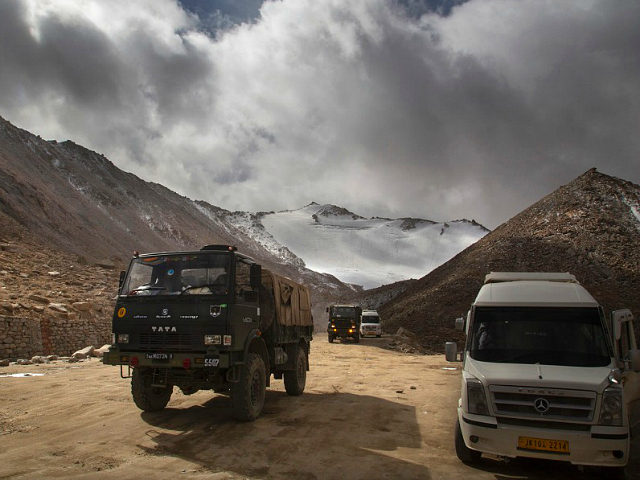Chinese state media on Monday claimed Indian troops invaded Chinese territory by crossing the Line of Actual Control (LAC), the disputed border in the Ladakh region of the Himalayas that was the scene of a deadly brawl between Chinese and Indian troops in June.
India, conversely, claimed it was China that made “provocative” moves across the LAC.
China’s state-run Global Times said all the provocations were coming from India:
Indian troops illegally crossed the Line of Actual Control near the south bank of Pangong Lake on Monday, destroying the previous consensus reached via different levels of bilateral talks, openly provoking and stirring tensions in the border area, Counselor Ji Rong, spokesperson of the Chinese Embassy to India, told media on Tuesday.
India’s moves have severely infringed on China’s sovereignty, violated the important consensus and agreements reached by the two sides and destroyed the regional stability and peace of the border areas, the spokesperson said.
What India has done goes against the efforts made by the two sides in defusing the tensions, and China firmly opposes it, Ji said.
Chinese Foreign Minister Wang Yi said his government remains committed to “maintaining stability” along the border and is “ready to manage all kinds of issues through dialogue with the Indian side.” He insisted Chinese troops have never crossed the LAC.
Another Global Times report scoffed at India’s statement that it “preempted” provocative Chinese military action, claiming that India’s use of the term “preempt” is proof that its troops “first took destructive actions” and “initiated the standoff this time” — language an equally nitpicky Indian partisan might point to as an admission that China caused the confrontation last time.
“The south bank of the Pangong Lake where the latest confrontation took place is under China’s control. India is trying to turn it into a new disputed area as a bargaining chip in negotiations. Obviously, India is taking an aggressive approach on border issues rather than prioritizing stability in border regions,” the Global Times wrote.
The language of “preemption” appeared in reports based on Indian Army statements that blamed China for acting aggressively, such as a Monday report from Swarajya:
The Chinese People’s Liberation Army (PLA) on the intervening night of 29 and 30 August carried out provocative military movements in an attempt to change the status quo at the Southern Bank of Pangong Tso in Eastern Ladakh.
An alert Indian Army though preempted this PLA activity and thwarted the Chinese intentions to unilaterally change facts on ground. The Indian Army also undertook measures to strengthen India’s positions.
Following China’s violation of consensus which was earlier arrived at during military and diplomatic engagements, a Brigade Commander level Flag Meeting is in progress at Chushul to resolve the issues.
As per defense journalist Shiv Aroor, no casualties were suffered by India in this face-off. The armies engaged in a hand to hand combat and no weapons were used.
The Global Times lectured India for foolishly picking a fight with “powerful China” and its ostensibly unbeatable People’s Liberation Army instead of tending to the coronavirus outbreak at home. It advised the Indian government against hoping for assistance from the United States, which can do nothing to “help India grab Chinese territory.”
“By provoking tensions at the border, New Delhi also aims to shift domestic attention, which is a hooligan behavior externally, and political flimflam internally,” the Global Times sneered.
The op-ed ominously ended with a call for China to “prepare to carry out a military struggle in the China-India border area,” confidently predicting that “India is no match for China” and accusing India of badly miscalculating by thinking it can get away with “opportunism.”
Yet another Global Times op-ed hammered the notion of India picking a border fight with China to distract Indian voters from coronavirus troubles and economic contraction at home.
“As a populous country with unsatisfactory public health facilities, the economic fallout of the virus hasn’t been fully visible yet, and the economic recovery period will be undoubtedly prolonged as long as the virus keeps spreading,” the Chinese newspaper predicted.
“In the meantime, New Delhi has been further deteriorating its business environment by seeking conflicts with China in economic and trade areas. Against the backdrop of dim global economic growth, it is expected that foreign investment in India will see setbacks, and further slow down its recovery pace of employment and economy,” it added.

COMMENTS
Please let us know if you're having issues with commenting.